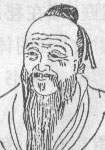“滄洲欲拭芰荷衣”的意思及全詩出處和翻譯賞析
“滄洲欲拭芰荷衣”全詩
巫峽寧知云雨夢,滄洲欲拭芰荷衣。
花間鸛鶴迎人起,波上魚龍挾棹飛。
不似南州庾開府,鄉關頭白苦思歸。
分類:
作者簡介(袁凱)

袁凱,生卒年不詳,字景文,號海叟,明初詩人,以《白燕》一詩負盛名,人稱袁白燕。松江華亭(今上海市松江縣)人,洪武三年(1370)任監察御史,后因事為朱元璋所不滿,偽裝瘋癲,以病免職回家,終“以壽終”。著有《海叟集》4卷。
《次楊廉夫先輩韻》袁凱 翻譯、賞析和詩意
《次楊廉夫先輩韻》是袁凱在明代創作的一首詩詞。以下是該詩的中文譯文、詩意和賞析:
吹笛春江煙霧稀,
清晨吹奏笛子,春江上的煙霧漸漸散去,
This line describes the scene of a spring morning, with the mist on the river gradually dispersing. The poet sets the atmosphere and creates a sense of tranquility.
幽芳小草總相依。
幽靜的芬芳小草相互依偎。
The delicate and fragrant grasses grow together in a secluded place, emphasizing their interdependence and harmony with nature.
巫峽寧知云雨夢,
巫山峽谷間的人們怎能知道云雨中的夢境,
The people in the Wushan Gorge are unaware of the dreams hidden within the clouds and rain,
This line expresses the mysterious and dreamlike nature of the Wushan Gorge, suggesting that the people there may be unaware of the wonders and illusions around them.
滄洲欲拭芰荷衣。
在滄洲,人們想要拭去濕潤的芰荷衣裳。
In Cangzhou, people wish to wipe off the wet clothes adorned with water lilies.
This line suggests a desire to remove the traces of a journey or experience, symbolized by the wet clothes, and move forward.
花間鸛鶴迎人起,
在花叢中,鸛鶴起舞迎接人們,
Amidst the flowers, storks and cranes rise to greet people.
This line depicts a lively scene where birds gracefully dance among the flowers, implying a joyous and harmonious atmosphere.
波上魚龍挾棹飛。
在波浪上,魚和龍搏擊水面,挾帶著船槳飛翔。
On the waves, fish and dragons splash and soar with the oars.
This line portrays a dynamic image of fish and dragons playing in the water, symbolizing the vitality and energy of nature.
不似南州庾開府,
與南州的庾開府不同,
Unlike the Yukaifu in Nanzhou,
This line highlights the contrast between the poet's current situation and the renowned poet Yukaifu in Nanzhou. It suggests that the poet's environment lacks the same level of inspiration or support as that enjoyed by Yukaifu.
鄉關頭白苦思歸。
在鄉關的頭上,我白發苦苦思念著歸鄉。
At the head of the hometown's pass, I, with white hair, yearn for home.
This line expresses the poet's longing for home and reflects the theme of homesickness and nostalgia.
整首詩詞以自然景物為背景,通過描繪春江、花叢、波浪等元素,展現出一幅寧靜、和諧、生動的自然畫卷。同時,通過對巫峽和滄洲的描寫,表達了人們對于未知和夢境的無知,以及對過往經歷的回憶和思考。
詩詞中還以庾開府為對比,凸顯了詩人的寂寞和對于回歸家鄉的渴望,傳達出離鄉背井的思鄉之情。
袁凱通過細致入微的描寫,巧妙地將自然景物與人情思緒相融合,展示了他對自然和人生的獨特感悟。整首詩抒發了對自然美的贊美和對人生命運的思考,使讀者在閱讀中感受到一種深邃而恬靜的意境。
“滄洲欲拭芰荷衣”全詩拼音讀音對照參考
cì yáng lián fū xiān bèi yùn
次楊廉夫先輩韻
chuī dí chūn jiāng yān wù xī, yōu fāng xiǎo cǎo zǒng xiāng yī.
吹笛春江煙霧稀,幽芳小草總相依。
wū xiá níng zhī yún yǔ mèng, cāng zhōu yù shì jì hé yī.
巫峽寧知云雨夢,滄洲欲拭芰荷衣。
huā jiān guàn hè yíng rén qǐ, bō shàng yú lóng xié zhào fēi.
花間鸛鶴迎人起,波上魚龍挾棹飛。
bù shì nán zhōu yǔ kāi fǔ, xiāng guān tóu bái kǔ sī guī.
不似南州庾開府,鄉關頭白苦思歸。
“滄洲欲拭芰荷衣”平仄韻腳
平仄:平平仄仄仄平平
韻腳:(平韻) 上平五微 (仄韻) 去聲五未 * 平仄拼音來自網絡,僅供參考;詩句韻腳有多個的時候,對比全詩即可判斷。